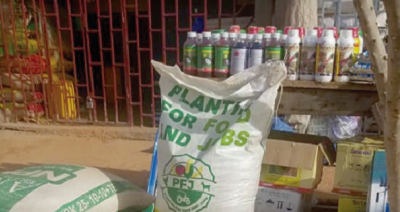The Chief Executive Officer of BEIT Farms, Farmer Evans Larbi says the government Fertilizer Subsidy Programme must be scrapped now because there is a lack of efficiency and transparency in the programme.
Farmer Larbi explained that annually the government allocates about 207 million Ghana cedi’s for the scheme to import fertilizers, which are subsequently supposed to be sold to farmers at 50% of the original market price; but the farmer says the subsidy programme is not benefiting, raising questions about where exactly the subsidized fertilizers go.
“If Ghana and the Ministry of Food and Agriculture want to achieve the Sustainable Development Goal 2 then the Fertilizer Subsidy Programme that was introduced by the government must be scrapped now,” he said.
Farmer Larbi made these remarks in an exclusive interview with the reporter on Ghana’s Agricultural Sector; challenges smallholder farmers face and how sector players are not plateful.
According to him, the youth could find the Agriculture sector attractive to patronize due to mismanagement of the sector, however, it is a noble sector that could employ the majority of the youth of Ghana and Africa.
“During this farming season, a number of we farmers across the country did not benefit from the Fertilizer Subsidy Programme. We are buying our own fertilizers from the open market at a very high price, making things difficult and expensive for young farmers like me”, farmer Larbi bemoaned.
“This season, my vegetables did not mature as expected because of lack of fertilizers and the change in climate pattern at Greater Accra and its environs. I grow vegetables such as Onions, Pepper, Tomato, Okra, Eggplant, Carrots and Cabbage” he added.
Farmer Larbi said farmers were shocked at recent disclosures by the Planting for Food and Jobs Secretariat which indicated that Ghana has lost a whopping 120 million Ghana cedi unaccounted for subsidized fertilizers in 2017 and 2018 planting seasons alone.
“This is a threat to the National Food Security. A lot of farmers’ productivity is low and this is a source of worry” he pointed out.
The CEO used the opportunity to call on the Banking Institutions to invest in irrigation systems and Dams across the country to support boosting productivity in the agriculture sector.
“I am not saying it should be built for free; it should come with a cost and we will pay for its services. Dams provide an annual water supply for consumptive purposes including irrigation, livestock and domestic use. They are important because they improve the viability and productivity of agricultural activities in local regions” he concluded.








